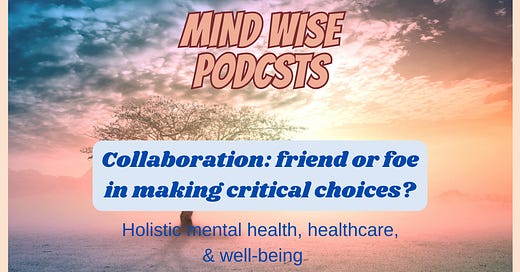Audio Podcast Click Above:
Video Podcast Click Below:
Script for Video and Audio Podcast:
Welcome to the Mind Wise Video podcast, which presents holistic mental health, healthcare, and wellness perspectives and information. I am your host, Ron Parks, MD writer, teacher, and consultant.
RP: Today’s video podcast is about:
Collaboration: friend or foe in making critical choices?
What is the cure for indecisiveness in personal, business, or political matters?
There is, I believe, an art to being more decisive. It requires developing your innate inner resources and collaboration with trusted others. What follows are several personal vignettes and discussions to highlight what to consider and do to be better guided when making important choices.
Mentoring or biased advice?
Recently, in a conversation with my adult son, I wanted to better understand the benefits versus the risks of collaboration with others during times of challenge and indecision. My son was in throngs of indecision about whether to return to graduate school. As a parent, one often finds oneself in the problematic place of wanting to give advice but knowing that if taken by your child, you might get blamed if things go awry and may not have supported their growth of self-confidence and independence. Our conversation concerned the value of my son calling and collaborating with his graduate school educators about what they were offering regarding courses and support. Doing so would help him better assess if returning would be in his best interest. But is seeking help or collaboration from others always the best consideration?
Making a discerning choice between two or more options is sometimes fraught with the potential of being misguided. Psychologists have called it a double bind when one gets stuck in not knowing which way to go, creating fear of the consequence of a possible poor choice. We all face these dilemmas and indecisive movements that may become protracted with undo worry and evolve into despair and health breakdown—physical, mental, and spiritual—with the loss of zest for living, ability for adaptive change, or thriving. Also, during times of challenge, our awareness of our human limitations and vulnerability comes to the forefront, and we can only know what we have learned with an occasional intuitive glimpse at future possibilities. With age and wisdom, at least to me, it has become apparent that help is often available by reaching out to others.
Collaboration with others may be easier for some than others. Ease with social communication can vary widely from person to person. Someone who has experienced significant trauma from others might be more reluctant to be trustful. Some may uniquely function best and express their talents by working alone, without pressure or distractions. An example would be those with a talented genetic predisposition to work and perform better when they can maximize their concentration without distraction from their environment or social interaction. People with such neurodiversity can be the best researchers, analysts, tech specialists, physicians, mechanics, artists, and other fields requiring exceptional intellectual ability to combine diverse data and elements for unique solutions for complex problems.
"Going from the frying pan into the fire when adversity prompted flight—perhaps the best I could do, considering the circumstances."
When I was young, in the earlier phases of my medical specialty training, I started in a residency graduate program at one of the prestigious institutions in the Midwest. I felt fortunate and privileged to get into what I thought was such an outstanding program. A relative of my wife was a leading neurosurgeon in our city and spoke highly of the program and how it got his career off to a successful start. Coming from a modest, industrious family with few members who had gotten medical, graduate, or college degrees, it was a big jump for me. I had trepidation about getting accepted into such a well-known residency training that was quite rigorous and demanding.
The day before I left with my wife for our new destination in a midwestern city, I met an older physician who had been in the same program that I was to begin. When I brought up proudly that I was going to start there also, he became upset, with a lot of expressed anger toward his former training program. He said the pressure there was immense, triggering intense anxiety and difficulty sleeping and focusing, to the point where he went to the psychiatry department there for some help. According to him, he was immediately dismissed when the residency program discovered it. He had to return home and restart his career and training at a local institution.
So, whatever my trepidation or fear, they increased maybe 1000% before I left for my new training opportunity. Earlier in my career, I had some difficulty with anxiety and occasional panic attacks, which I thought I had learned to manage.
When my wife and I arrived in the quiet, conservative, midwestern town home to my new internal medicine residency, we were well received and befriended by another physician on the faculty there and his family from our hometown area. I admired him and his work in preventive medicine and research and thought this might be an area for me to pursue. A rigorous schedule began for me, including night calls, and I felt the stress with mounting anxiety and increasing irritable bowel symptoms, especially as I was on the run all the time and grabbing snacks. I did not realize then how gluten-sensitive I was.
It was a time when I could have received some wise counseling or guidance beyond the small circle of friends that my wife and I had. Of course, I was terrified of what the older former trainee, previously at the same institution, had told me about being dismissed from the program when he reached out for help. Also, several of my fellow physicians were up in arms about the weaknesses and abuse they felt from the program. The faculty physician I knew there was a way on a sabbatical. So, as I thought I had to be resourceful, I needed to seek a better situation on my own.
With my wife's support, I got on the phone. I called some of the top Master of Public Health and Preventive Medicine programs on the East and West Coast. I thought I would pursue an academic career as the physician I befriended on the current program faculty. One physician I reached was the head of the Preventive Medicine Program at UCLA in Los Angeles. He was amazed that I called at that moment, and when he heard of my plight, he said that he had just gotten a grant for a new training position and asked how soon I could transition out there.
My wife and I pulled together in the fantastic collaboration we have had in a short amount of time. I resigned from the residency program. I told them about my acceptance into the new program and my desire to attend. The residency program director said they had 200 other resident trainees and could accommodate me for the new position. We got a rental truck, packed all our belongings, and got to Los Angeles in two weeks.
When we arrived, I was warmly greeted by my new boss and head of department at UCLA. As he could not get me a paycheck immediately, he reached into his pocket and gave us cash to tide us over for a few days. I felt immediately at home and well-supported. But the quick transition would take a toll on my psyche that I could not have expected.
From the beginning, I found things disappointing in the new program, such as lacking the content, structure, and training I had expected. I fretted I had not given enough consideration to my choice by not doing enough investigation or consulting others. I felt increasingly anxious, with my thoughts racing to find some helpful solutions, and I had difficulty relaxing or sleeping. Venting with the calming influence of my wife or talking with close friends in the area did not help. I felt terrified and insecure that maybe I had ruined my career with an impulsive decision.
I knew I had to seek help, so I took a deep breath and made an appointment with a psychiatrist in the student health program.
Once I had reached out for help, I felt some relief. It was my great fortune that the person assigned to me was very understanding, humanistic, and listened with compassion. She astutely observed that I was more angry than anxious, probably with myself, but mainly with the program for not meeting my expectations, especially with my prior training and academic background. The psychiatrist was not arrogant, didn't label me or pigeonhole me into some diagnosis to medicate me, but was there to allow me some space and time for insight with her collaboration and support. I felt understood and validated. I almost immediately felt clarification of my dilemma and the direction to take. Most importantly, I felt relief from my worry and anxiety.
It was a one-session wonder, as I felt quickly back to normal. The door remained open if I needed to talk more in the future. The psychiatrist was a role model for me when I went into psychiatry later in my career. Also, my long-time friend, Jay, suggested a part-time clinical job at the LA County Hospital emergency room where he was training, the busiest hospital emergency room in the country. Re-engaging in some clinical work was very helpful and grounding.
Getting in touch with my feelings, especially anger, helped me get unstuck and act. Almost directly, I went to my new program's faculty and the head of the department, where I vehemently expressed my concern and disappointment. With my assertiveness, additions, and modifications occurred, making the program more workable and valuable to my needs. It became an excellent program for me and helped to launch my career in areas suitable for my interests and talents.
Perhaps it is a lengthy story, but it makes a point about the value of collaboration, seeking help and guidance at critical junctures when feeling overwhelmed, where two heads might be better than isolation in your reasoning. There are two sides, the positive and negative, of advice, influence, and collaboration with others, as indeed, in some situations, it can be counterproductive or even destructive. There is always the danger of losing one's agency, free will, or inner integrity when under the unhealthy influence of significant others.
In today's world, the risk of dependence on trusting others who are strong influencers that can affect our choices, decisions, and life directions is especially critical as it is a time of the growth of the media and the power of influential people that use self-serving propaganda such as seen in cults, and ideological or political movements. Some even depend on AI search engines or programs like Google for information or guidance, which can be misleading or erroneous.
The paradox of my favorite mentor's advice is to "never give anyone advice."
In the early years of my training, one of my best-loved mentors, Sam, gently guided me in the art of listening and allowing the other person to find their inner voice, perspective, purpose, and meaning. When I had to leave and move onto a new city and program, he warmly embraced me and, with a smirk, teasingly told me his last clinical pearl was never to give anyone advice. The role of an advisor, therapist, teacher, or expert in his field, as I learned from my favorite mentor, Sam, was to be an excellent, compassionate listener and collaborator, to allow the space for insight, learning, and healing to occur through healthy dialogue and collaboration.
Evaluating the value or potential risks of choosing a different path based on the influence of another.
It may be hard to judge choices influenced by others until time has passed and we can better assess the impact of a critical decision at a vital life juncture. I remember when I was early in college, under stress, adjusting to the challenge of my new, demanding life situation. I befriended and maybe came under the influence of a more senior student who had left school for a couple of years to study and live at an Israeli kibbutz. He said the experience had changed his life. He started working with me on how I could access and sign up for the same program he did.
I became enamored with the idea and romance of getting out, or perhaps escaping from my early college challenges, dropping out and going abroad. I shared my dilemma with one of my older, admired brothers on a visit home. He was aghast at my thought of doing so as we came from a very modest, hard-working family, where opportunities for education and career were a luxury available to a few of us.
Our dialogue or collaboration sobered me and made me reflect on the pros and cons of not completing the educational track I had started because of deep fears of not being good enough to succeed in a traditional academic track. I stayed the course. It all led to my career and work, which has been gratifying. I cannot say that at my current age, that time will tell, or if it's worth having any lingering regrets that the other path would have been a better life choice.
Collaboration with a trusted other prevented me from falling under the unsavory influence of a famous yoga guru.
Another time, when I was a year away from completing my medical residency, I became fascinated with yoga and the holistic culture of wellness. I studied when the opportunity arose with a well-known and esteemed yoga teacher and guru who had established quite a following. Some of his followers invited us to a retreat in the mountains of Pennsylvania. There was a strong flavor of merriment, celebration, the awe of the teacher and what he represented, spiritual openness, and admiration for exotic organic, healthy food, movement classes, and exercise, including yoga and meditation practices. I felt intoxicated by him and was excited to be invited to his quarter for a meeting. The excitement made my head spin a little. He was establishing a more significant holistic yoga-oriented health center in the mountains on his large retreat-like center property. He offered me a cottage for free where my wife and I could live if I left the current medical residence training. I would not be paid for my professional services there and would only receive room and board for my wife and me. Also, I would be one of his trainees and disciples.
I felt special and excited and told him I would consider it. I left his cottage on the hill and descended the well-kept and flowery path down to the bottom retreat site, feeling euphoric and giddy. My wife joined me on the path, and I excitedly told her the story. My wife has always been my most valued confidant and collaborator when faced with hard choices. In a few words, she deflated the influence of the highly esteemed yoga guru or perhaps a cult leader. I do not remember Jan's exact words, but they might have been, "'Are you crazy?' 'You are only one year from completing your specialty training.'" My trust and openness to her collaboration brought me back to a more sensible reality, which she had done more than a few times at critical junctures during our marriage. These were times when I was more challenged by inner conflicts and turmoil and not totally in touch with the larger perspective. With time, do I regret my choice to continue my career path? Here, not at all, as I incorporated much of my learning from my later developed work and teachings in holistic and integrative medicine.
Tips and Points to Ponder:
1. Realize the importance of collaboration with others.
But always be aware of being overly influenced by another with an agenda that may not be in your best interest. Advice givers often have biased opinions that do not always support the most beneficial or ideal choices for you. Avoid getting entrapped by your or another's logic, shallow perspective, and partial or rigid thinking. With more openness, input, or feedback from your intuition, inner wisdom, sensibility, or trusted others, and outside resources, you can gain greater perspective and flexibility and find better options to make discerning choices.
2. Develop the art of accessing the mind and consciousness's wise, intuitive, and rational aspects.
Establish ease in moving to an inner peaceful place where clear-minded reflection is possible, away from a turbulent or overthinking mind, worrying, configuring, constructing, planning, strategizing, etc. The ability to move to that quiet place of reflection comes naturally for some, and others require practice and study by oneself or with a teacher. The benefits are immense and perhaps essential for mental, spiritual, and physical health, balance, and well-being.
Thanks for your interest in the above article. Please share with others.
I appreciate your interest; your ideas and comments are welcome. Please share with others. A special thanks to Shan Parks, editor and project manager for ParksPress, for his invaluable collaboration in developing and editing the final article.
Subscribe to my Substack Newsletter and podcast at www.inmindwise.com. All content is created and published for educational purposes only. It should not be considered as a substitute for professional or medical services or guidance. Always seek your healthcare provider’s care regarding medical or mental health conditions. This communication is not intended to provide medical diagnosis, recommendation, treatment, or endorsement. Thank you.
---
For the complete article and other information about Dr. Parks and his work, and the article: go to https://parksmd.com/collaboration-friend-or-foe-in-making-critical-choices/
Go to https://parksmd.com/scheduling/ for help setting up or improving your holistic program for mental and physical health and well-being.











Share this post